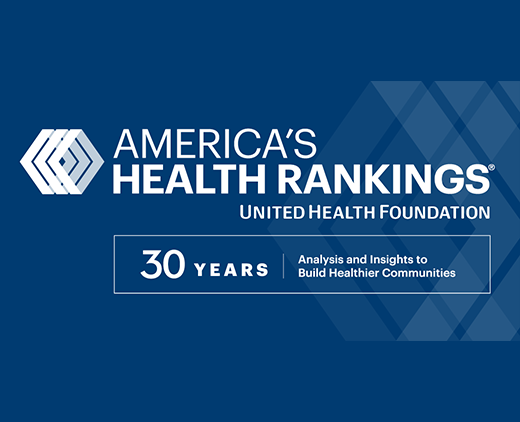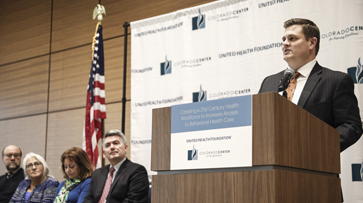The nation’s obesity rate has reached the highest-ever level this year, according to the United Health Foundation’s 2018 America’s Health Rankings® Annual Report. Obesity is a leading contributor to cardiovascular disease, cancer and other conditions. Additionally, an increase in drug deaths, suicides and cardiovascular disease deaths is contributing to an increase in premature death.
In its 29th year, the America’s Health Rankings Annual Report also reveals bright spots, including the reduced rate of childhood poverty and an increased number of mental health providers and primary care physicians per 100,000 people. Key findings include:
Obesity Prevalence Reaches All-Time High; Premature Deaths Continue to Increase
- The obesity rate exceeded 30 percent of the adult population for the first time in America’s Health Rankings history, up 5 percent in the past year (from 29.9 percent to 31.3 percent).
- Premature deaths increased 3 percent (from 7,214 to 7,432 years lost before age 75 per 100,000 people).
Suicide Rate Increases
- The suicide rate has increased 16 percent since 2012 (from 12.0 to 13.9 deaths per 100,000 people).
- The suicide rate is 3.5 times lower in New Jersey – the state with the lowest rate for this measure – with 7.5 deaths per 100,000 people, compared with Montana, the most at 26.0 deaths per 100,000.
- The suicide rate is much higher among males: 22.2 deaths per 100,000 compared with females at 6.2 deaths per 100,000.
Childhood Poverty Percentage Decreases; Number of Health Care Providers Increases
- Childhood poverty – a key indicator of socioeconomic status and overall health – decreased 19 percent in the past five years from 22.6 percent in 2013 to 18.4 percent in 2018, and decreased 6 percent since 2017.
- The number of mental health providers per 100,000 people increased 8 percent and the number of primary care physicians increased 5 percent nationwide in the past year.
“This year’s Annual Report spotlights an obesity problem that continues to grow. This means more people will likely develop obesity-related chronic diseases like cardiovascular disease, diabetes and cancer,” said Dr. Rhonda Randall, chief medical officer of UnitedHealthcare National Markets, and an adviser to America’s Health Rankings. “We encourage health professionals, public health officials and elected leaders to use these findings to explore opportunities to better support people in their communities in all aspects of their health.”
State Rankings in 2018: Hawaii Ranks No. 1, Louisiana Ranks No. 50
The Annual Report ranks Hawaii as the healthiest state in 2018, followed by Massachusetts (2), Connecticut (3), Vermont (4) and Utah (5). Louisiana ranks as the most challenged state this year, while Mississippi (49), Alabama (48), Oklahoma (47) and Arkansas (46) round out the states with greatest opportunities for improvement.
Maine, California and North Dakota experienced the largest rank improvements since last year, with Maine rising seven places to No. 16, and California and North Dakota jumping five places to No. 12 and 13, respectively. Oklahoma experienced the largest rank decline, falling four places to No. 47.
In an effort to continually improve its offerings and capabilities, America’s Health Rankings now offers a new “Adjust My Rank” tool. This feature enables users to better understand their community’s and state’s diverse public health needs and challenges, to gain insights on how to improve their state’s rank.
America’s Health Rankings
America’s Health Rankings Annual Report is the longest-running annual assessment of the nation’s health on a state-by-state basis. For 29 years, the report has analyzed a comprehensive set of behaviors, community and environmental conditions, policies, clinical care and outcomes data to provide a holistic view of the nation’s health. This report looks at 35 core measures across these categories.
About the United Health Foundation
Through collaboration with community partners, grants and outreach efforts, the United Health Foundation works to improve our health system, build a diverse and dynamic health workforce and enhance the well-being of local communities. The United Health Foundation was established by UnitedHealth Group (NYSE: UNH) in 1999 as a not-for-profit, private foundation dedicated to improving health and health care. To date, the United Health Foundation has committed $430 million to programs and communities around the world. We invite you to learn more at www.unitedhealthgroup.com/SocialResponsibility


Share This Story